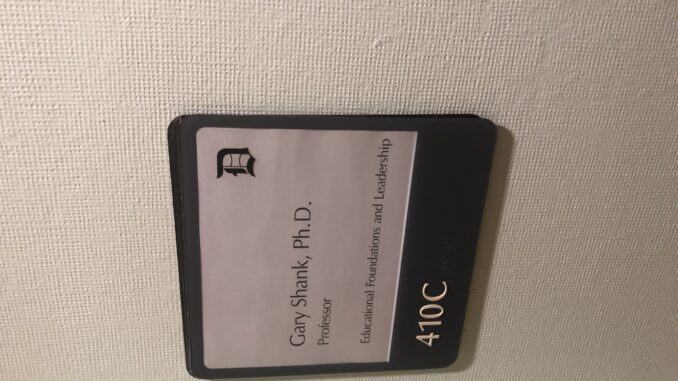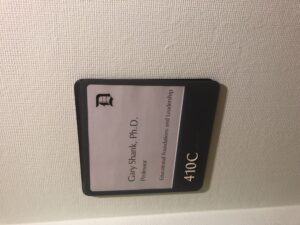
1/28/2021
Kellen Stepler | Editor-in-Chief

Duquesne University’s Grievance Committee for Faculty (UGCF) recommended that Gary Shank, the education professor who was fired for using a racial slur in a class lecture during the fall semester, should be restored as a faculty member of the university.
Shank had filed a grievance with the UGCF on Nov. 5. He was terminated from Duquesne Oct. 7.
In a report filed Jan. 14 provided to The Duke by Shank’s attorney, Warner Mariani, the UGCF found that while Shank “exercised extremely poor judgment in his decision to use the N-word rather than an abstraction,” the termination of his tenure and firing were not warranted.
“While Dr. Shank’s use of the N-word was misguided, it was not malicious,” the report said.
According to Mariani, the report was sent to Duquesne last Friday, and cited the university handbook which states that President Ken Gormley has 15 working days to decide the case.
Mariani also provided a document setting Shank’s position to the UGCF’s findings. Shank said that while the UGCF report gives the “appropriate recommendation” that he be restored as a faculty member, he is “concerned that the [UGCF] recommends that I be sanctioned and also takes a rather restrictive view of the meaning of Academic Freedom on Duquesne University’s campus.”
“Therefore, I feel it necessary to take exception to several of the Report’s findings in order to make my position clear that sanctions are not called for here, and that an expansive view of Academic Freedom must be asserted not only for me, but the rest of the University’s faculty,” Shank wrote.
“Disagreement with a professor’s style and method of teaching cannot serve as grounds for “serious misconduct” in violation of TAP 55.”
UGCF’s report also said that Duquesne did not violate Shank’s academic freedom, as the university does not subscribe to the American Association of University Professors (AAUP) guidelines on academic freedom. In October 2020, the AAUP wrote a letter to Gormley demanding Shank be reinstated at the university.
Shank wrote that if Duquesne does not subscribe to the AAUP guidelines on academic freedom, and if the use of the N- word is a violation of TAP 55, then Duquesne needs to immediately prohibit the use of the N-word “for whatever reason it may be used.”
“For that matter, the university should ban any word that possibly could violate TAP 55 and let the university’s faculty know that the use of certain language is strictly prohibited and may result in disciplinary action up to and including their discharge,” he wrote.
The report also says that the university provided due process to Shank prior to his suspension and termination, citing sections 9.2 and 9.3 of the Faculty Handbook. The report also said that Shank refused to meet with school of education interim dean Gretchen Generett without the presence of his attorney prior to his termination, and that he was provided the opportunity to appeal the disciplinary actions to the UGCF.
Shank wrote that while he taught his class in a manner that he believed at the time to be “totally appropriate,” Generett “committed herself from the onset to the most severe disciplinary action” and searched for a justification to support her
actions “even going so far as to cherry pick reviews of disgruntled former students made over the decades of my teaching at Duquesne.”
Citing her testimony, Shank wrote that “The real reason for the termination is made clear by the testimony of Interim Dean Generett when she criticized my teaching style by saying she thought my class presentation was ‘thoughtless’ because I failed to ‘set things up’ and also be-cause I did not use derogatory comments as to any other group other than African-Americans.”
Shank wrote that, pursuant to AAUP guidelines, he believes that in order for classroom speech not to be protected under academic freedom, the offending language must be “persistent, pervasive, and not germane to the subject matter.”
“That is not the case here,” he wrote.
Shank wrote that Gormley should recuse himself because Gormley “prejudged me as to whether my conduct was appropriate, and because of the publicity he believes negatively impacted Duquesne University.”
Gormley e-mailed all students on Sept. 12 — a day after the video gained traction on social media — writing that the professor “will face very strong disciplinary action pursuant to the procedures set forth in our faculty handbook.”
However, Gormley should not recuse himself as the final arbiter of the case, the report said, and that as university president, he had a responsibility to “mitigate the damage of Duquesne’s reputation” as the video of Shank using the racial epithet gained traction on social media, as well as traditional media outlets. The report says that Gormley was not involved with the investigation of Shank’s case, or the decision to fire him. The faculty handbook does not provide an alternative to the president as an arbiter of the case.




